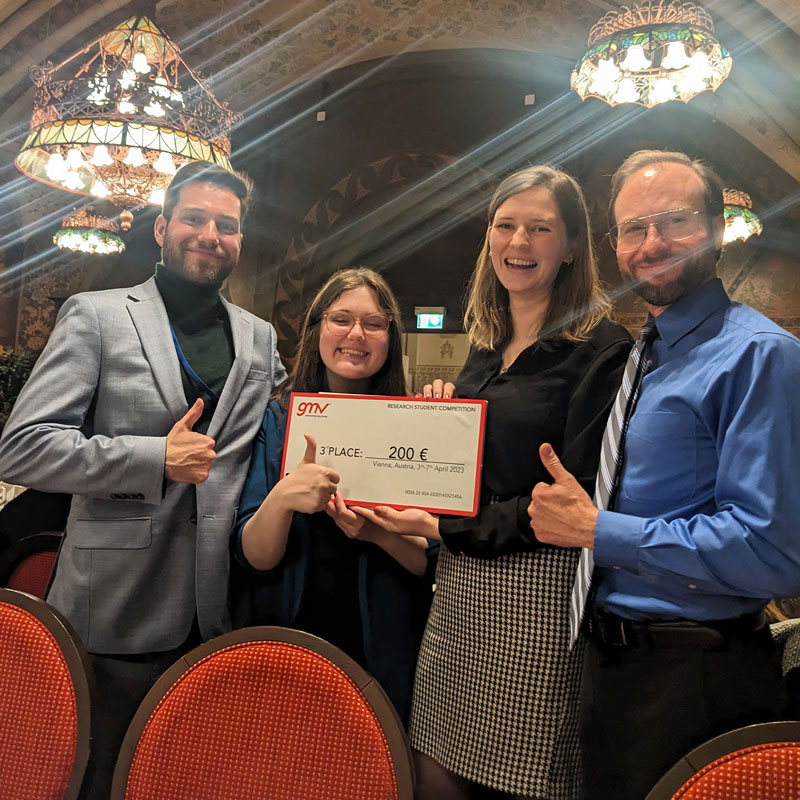 |

|
 |
THEO & MUFFIN team members Raymond Squirini, Grace Zimmerman and Melissa Buys with Professor Brent Barbee at the 2023 Planetary Defense Conference. |
|
Asteroid impacts have been sensationalized by Hollywood, but there are very real ramifications for life on earth in the event of a future asteroid impact. While the probability is small, it is not zero, so to prepare for a potential event, NASA’s Center for Near Earth Object Studies creates hypothetical asteroid impact scenarios that challenge researchers and scientists to devise solutions and develop tactics for responding to theoretical asteroid impacts on Earth. This year, those ideas were presented during the International Academy of Astronautics’ (IAA) annual Planetary Defense Conference (PDC) held in Vienna, Austria in April.
Among the presenters was a team of University of Maryland Department of Aerospace Engineering graduate students from the department’s ENAE603 course, Near-Earth Object Exploration. What started as a class project became an opportunity to present at the international conference.
“As part of the class, we had a big group project to design a mission to a near-Earth asteroid,” explained Melissa Buys, a Ph.D. graduate student, and part of the team which participated in this year’s IAA PDC. “Professor [Brent] Barbee told us about the conference and the annual asteroid impact scenario and suggested anyone interested could use it for our mission design.”
Buys and her team members thought the exercise was a perfect fit for them, and enabled them to create a mission that everyone could find a role in. Buys’ area of interest is mission design and exploration while her five teammates worked on developing trajectory designs, spacecraft and nuclear payload designs, and the CONOPS (Concept of Operations).
“The scenario’s [hypothetical] asteroid, called ‘2023 PDC,’ was 800m in diameter. A pretty substantial size for an asteroid,” said Buys. “We think that it is very likely they chose a such a big asteroid for the hypothetical scenario so we could have a conversation around using nuclear detonations in space, which are currently banned under international agreements.”
The name of the mission they developed to mitigate the threat posed by the hypothetical asteroid 2023 PDC was the Terrestrial Hazard Exploration Orbiter (THEO) and Mitigation Using a Fission Nuclear Device (MUFN), which provided a start-to-finish approach including a rendezvous and observation mission to the asteroid, allowing for mapping and tracking, as well as a secondary mission craft to detonate a nuclear explosive device (NED) near the asteroid to ablate the surface, producing a momentum change strong enough to deflect it from its original Earth-impacting trajectory.
By the end of the course, the team had a mission design they could submit to the IAA’s Planetary Defense Conference. Buys credits Professor Barbee with helping them refine their project, providing feedback along the way geared towards getting their work conference-ready.
“We ended up being the only group to present a start to finish mission design,” added Buys. “And while most papers submitted for the hypothetical asteroid focused on one very specific aspect of the hypothetical asteroid, such as environmental impact, etc., we presented a clearly laid out mission from start to finish including spacecraft design, data collection, and mitigation.”
Once accepted, several team members had the opportunity to travel to Vienna and present their work during the Planetary Defense Conference along with peers, researchers, and scientists from around the world.
“It was a surreal experience to be sitting in a room where people make decisions on the world about how things work, and we’re talking about planetary defense,” said Buys about her experience at the conference, which was hosted in the United Nations Office at Vienna. “But the whole experience, and the class, really reinvigorated my love for aerospace engineering, and I was exposed to a whole new set of ideas around engineering and planetary defense.”
The team’s THEO and MUFN asteroid mission project also went on to take third place in the conference’s student paper competition. Professor Barbee also attended the conference and enjoyed watching his students in action.
“I couldn’t be more proud of or impressed by what the students have accomplished, both in their work in my course and how they performed at the conference,” he said. “This is great example of Maryland students doing world-class work, leading the way, and building a better future.”
“Professor Barbee is a really great professor, and was incredibly enthusiastic about his topic, which really helped us with our project, and we were able to explore a lot of random tangents we were interested in,” added Buys. “Everyone in the department needs to take his classes!”
UMD PDC THE0 & MUFN Mission Team:
- Melissa Buys, THEO spacecraft design and science justification
- Raymond Squirini and Jonathon Gabriel, MUFN Nuclear Payload Design and CONOPS
- Hannany Salehuddin, THEO spacecraft design
- Connor Wilson, MUFN Spacecraft Design
- Grace Zimmerman, Trajectory Design for THEO and MUFN
Related Articles:
Senior Jerry Liu Receives NSF Graduate Research Fellowship
Gustavo Lang Jr. Receives CMSE Director’s Award
Two Aerospace Engineering Students Receive Maryland Engineering Dean’s Awards
Congratulations to Our 2023 Department Honors & Award Recipients
Two UMD Teams Take Top Spots in SAMPE Bridge Contest
UMD Student Ryan Jones Awarded DoD SMART Scholarship
Aerospace Engineering Grad Student Wins SPIE Student Paper Award
Senior Erika Maher Receives 2022 Wings Club Scholarship
Two Aerospace Engineering Students Named 2022-2023 Philip Merrill Presidential Scholars
Two Students Take Top Awards at AIAA YPSE Conference
May 16, 2023
|

